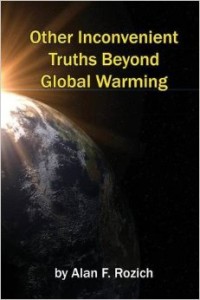
Alan F. Rozich
5.0 out of 5 stars HUGELY Valuable Book with Color Photographs, Embedded Yellow Highlights, March 16, 2014
This is one of the most useful, most intelligent, best presented and most timely books I have ever held in my hands. I am astonished by the affordable price in relation to both the substance and the cosmetics of the book. This is a focused holistic book that is a joy to read — easy to read — and it offers the single best text I have found for both graduate and undergraduate reading, and book clubs as well as government employees struggling to understand the lies and mis-representations of those seeking to avoid or undermine regulatory oversight.
The print size and use of white space is complemented by something I have never seen in a mass market paperback, full color photographs, full color diagrams, and the selective use of yellow highlighting embedded across the book.
This is a book steeped in integral consciousness, with a clear understanding and articulation of the fact that global warming is a symptom, not a root cause, and that global warming is but one of multiple inconvenient truth, all of which much be understood as a whole.
This is a very up-to-date book, with references at the end of each chapter coming up to 2013. The book frames problems and provides executable actions within each chapter. It also provides — and I am a technical idiot — the science and the technology is explanations with diagrams that I can understand. This is a book on the art and science of reconciling humanity and the Earth that anyone can appreciate. It is a multidisciplinary book replete with ethics at every point.
The tri-fecta is energy, water, and waste emissions from a combination of agriculture and economy.
QUOTE (71): “The object of life is not to be on the side of the majority, but to escape finding oneself in the ranks of the insane.”
I am stunned to find that Walmart shines in this book, working rapidly toward 100% renewable energy for its stores, and having achieved a 70% reduction of waste from its various processes. I also recollect reading elsewhere that Walmart pioneered the use of batteries in its long-haul trucks so the drivers would not idle their fossil fuel engines while sleeping or resting in their trucks, and this saved Walmart tens of millions in fuel costs while also stopping that portion of its emissions.
The biological and chemical chapters that would normally leave me with eyes glazed over are superb, crystal-clear, ably illustrated (in color, I love it), and segue into ten environmental success stories followed by fourteen renewable options for humanity.
Chapter 10, focused on the nexus of agriculture, water, and energy is fascinating and could be pulled from the book as a partial reading for students at any level from advanced high school to graduate school.
QUOTE (497): “The continued functionality of human society is at a pivotal point.”
I certainly agree with that. The ten high level threats to humanity identified in A More Secure World: Our Shared Responsibility–Report of the Secretary-General's High-level Panel on Threats, Challenges and Change include, in this order, 01 Poverty, 02 Infectious Disease, 03 Environmental Degradation, 04 Inter-State Conflict, 05 Civil War, 06 Genocide, 07 Other Atrocities, 08 Proliferation, 09 Terrorism, and 10 Transnational Crime. While this book focused on threat #3, it is actually relevant to ALL of the threats, for contrived scarcity along with institutionalized corruption are the root of most of our ills.
The book ends with a Glossary-Thesaurus of 115 terms of art and science, each explained in a paragraph. The index is not complete. Tesla, for example, appears in the book but not in the index.
As it happens I have spent a lot of time in this arena, and am a fan of Dr. Herman Daly, father of ecological economics, and many others. My lists of lists of my Amazon reviews are easily found by searching for them as listed below:
Worth a Look: Book Reviews on Climate Change
Worth a Look: Book Reviews on Disease
Worth a Look: Book Reviews on Environmental Degradation (Other than Emissions)
Worth a Look: Book Reviews on Peak Oil
Worth a Look: Book Reviews on Poisons, Toxicity, Trash, & True Cost
Worth a Look: Book Reviews on Water
I find only two gaps in this book. First, I find the author to be overly enamored of super-grid concepts for addressing energy needs. While he does mention micro-grids, I would have preferred to see more emphasis on the importance of decentralized resilience. Second, despite being up to date as of 2013, the book does not offer insights into the wealth of new energy options such as Sepp Hasslberger has been curating for us all on physics, economy, new energy, and more.
I strongly recommend this book. As the author himself notes, no amount of public policy or private investment will suffice to overcome ignorant citizens. Informed engaged citizens are the heart of the matter. This book is a major contribution to the latter end.
Best wishes to all,
Robert David STEELE Vivas
INTELLIGENCE for EARTH: Clarity, Diversity, Integrity, & Sustainability




